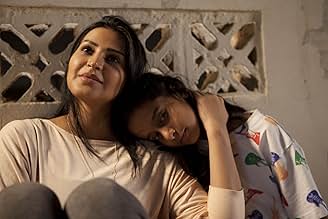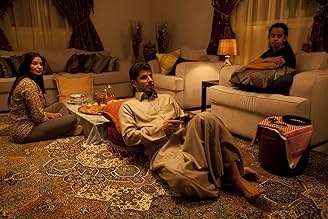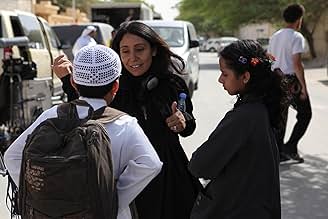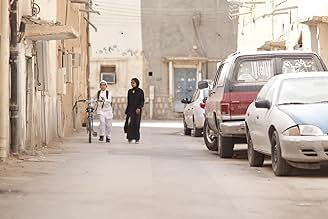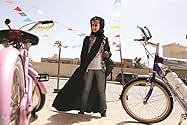IMDb-BEWERTUNG
7,5/10
21.901
IHRE BEWERTUNG
Ein Mädchen in Saudi-Arabien meldet sich beim Koranwettbewerb ihrer Schule an, um das erforderliche Geld für ein grünes Fahrrad zu sammeln, das sie unbedingt haben möchte.Ein Mädchen in Saudi-Arabien meldet sich beim Koranwettbewerb ihrer Schule an, um das erforderliche Geld für ein grünes Fahrrad zu sammeln, das sie unbedingt haben möchte.Ein Mädchen in Saudi-Arabien meldet sich beim Koranwettbewerb ihrer Schule an, um das erforderliche Geld für ein grünes Fahrrad zu sammeln, das sie unbedingt haben möchte.
- Nominiert für 1 BAFTA Award
- 22 Gewinne & 36 Nominierungen insgesamt
Abdullrahman Al Gohani
- Abdullah
- (as Abdullrahman Algohani)
Sara Al Jaber
- Leila
- (as Sara Aljaber)
Ausgewählte Rezension
In a land where where cinemas are illegal, the first feature film shot entirely in Saudi Arabia by its first female director, 'Wadjda' is simple yet alluring neorealist film about a child and a bicycle. Haifaa Al-Mansour's brave effort gives us an interesting glimpse into the lives of women in a strict religious country like Saudi Arabia.
Being scolded for not wearing a head-scarf to school and for singing when her father's friends are in the other room (women unable to show themselves or their talents in presence of men), being sexually harassed by a building site worker, seeing her mother sad and angry because her dad is about to marry another woman (desperation for a male heir and the existence of polygamy), her mother almost losing her job because of her dependence on a rude driver (women are not allowed to drive any kind of transport), seeing one of her classmates getting married (rare but existent child marriages), seeing two elder schoolmates get wrongfully accused of immoral intimate conduct, and feeling disappointed after not seeing her name in the family tree (only male children are given importance); these are just few of the female struggles we see through the eyes of our young tomboy heroine, Wadjda. From the very first scene where she stands out in a group of singing school girls with her converse shoes, we see Wadjda as someone rebellious and strong. In a repressive land where women are oppressed, based on strict religious laws, not only by men but by other women as well, Wadjda dreams of having a green bicycle, so that she could overtake her annoying yet caring friend Abdullah. Though girls are not allowed to ride bikes, she starts collecting money by selling love-song mixed tapes and football club bracelets to her schoolmates. And thus begins her journey. Just like 'The Bicycle Thief', the bicycle here signifies freedom.
The young yet incredibly talented Waad Mohammed gives a charming performance, and carries the movie on her shoulders with terrific ease. Waad along with Haifaa (Director) are the two brave talents that emerge from this feature. All the supporting actors act commendably as well. International composer Max Richter's background score is subtle yet as captivating as the movie itself. Shot with such authentic beauty, there are many scenes which stay in your mind long after the movie is over, one of which is where the young friend Abdullah asks Wadjda, in an adorably sweet way, if she knows that he wants to marry her when they grow up; the scene has a lot of meaning and hope attached to it.
It's not just a critique on Saudi society, but it's a universal story which talks about a society's limitations and possibilities.
Being scolded for not wearing a head-scarf to school and for singing when her father's friends are in the other room (women unable to show themselves or their talents in presence of men), being sexually harassed by a building site worker, seeing her mother sad and angry because her dad is about to marry another woman (desperation for a male heir and the existence of polygamy), her mother almost losing her job because of her dependence on a rude driver (women are not allowed to drive any kind of transport), seeing one of her classmates getting married (rare but existent child marriages), seeing two elder schoolmates get wrongfully accused of immoral intimate conduct, and feeling disappointed after not seeing her name in the family tree (only male children are given importance); these are just few of the female struggles we see through the eyes of our young tomboy heroine, Wadjda. From the very first scene where she stands out in a group of singing school girls with her converse shoes, we see Wadjda as someone rebellious and strong. In a repressive land where women are oppressed, based on strict religious laws, not only by men but by other women as well, Wadjda dreams of having a green bicycle, so that she could overtake her annoying yet caring friend Abdullah. Though girls are not allowed to ride bikes, she starts collecting money by selling love-song mixed tapes and football club bracelets to her schoolmates. And thus begins her journey. Just like 'The Bicycle Thief', the bicycle here signifies freedom.
The young yet incredibly talented Waad Mohammed gives a charming performance, and carries the movie on her shoulders with terrific ease. Waad along with Haifaa (Director) are the two brave talents that emerge from this feature. All the supporting actors act commendably as well. International composer Max Richter's background score is subtle yet as captivating as the movie itself. Shot with such authentic beauty, there are many scenes which stay in your mind long after the movie is over, one of which is where the young friend Abdullah asks Wadjda, in an adorably sweet way, if she knows that he wants to marry her when they grow up; the scene has a lot of meaning and hope attached to it.
It's not just a critique on Saudi society, but it's a universal story which talks about a society's limitations and possibilities.
- akash_sebastian
- 13. Feb. 2014
- Permalink
Handlung
WUSSTEST DU SCHON:
- WissenswertesBecause of restrictions placed on women in Saudi Arabia, director Haifaa Al-Mansour was not allowed to interact with her mostly male crew. She had to direct the street scenes from a nearby van, watching through a monitor and giving instructions via walkie-talkie.
- PatzerWhen Wadjda takes the bread out of the oven, mic equipment is visible on her waist, under her T-shirt.
- VerbindungenFeatured in At the Movies: Venice Film Festival 2012 (2012)
- SoundtracksDead Island
© Copyright 2012 and Published by Deep Silver, a division of Koch Media
Gmbh, Gewerbegebiet 1, 6604 Hofen, Austria.
Developed 2011, Techland Sp, z.o.o., Poland,
© Copyright 2012, Chrome Engine, Techland Sp. z.o.o.
Top-Auswahl
Melde dich zum Bewerten an und greife auf die Watchlist für personalisierte Empfehlungen zu.
Everything New on Hulu in March
Everything New on Hulu in March
There's a whole lot to love about Hulu's streaming offerings this month — get excited for brand-new series premieres and film favorites to watch at home.
Details
Box Office
- Bruttoertrag in den USA und Kanada
- 1.347.747 $
- Eröffnungswochenende in den USA und in Kanada
- 41.253 $
- 15. Sept. 2013
- Weltweiter Bruttoertrag
- 6.499.169 $
- Laufzeit1 Stunde 38 Minuten
- Farbe
- Sound-Mix
- Seitenverhältnis
- 1.85 : 1
Zu dieser Seite beitragen
Bearbeitung vorschlagen oder fehlenden Inhalt hinzufügen










